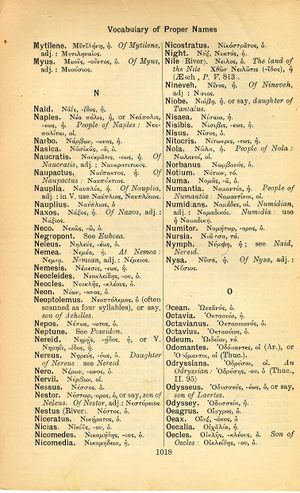Nessus: Difference between revisions
ὡς οὐδὲν γλύκιον ἧς πατρίδος οὐδὲ τοκήων γίνεται, εἴ περ καί τις ἀπόπροθι πίονα οἶκον γαίῃ ἐν ἀλλοδαπῇ ναίει ἀπάνευθε τοκήων → More than all pleasures that were ever made parents and fatherland our life still bless. Though we rich home in a strange land possess, still the old memories about us cling.
m (Text replacement - "}}]]" to "}}]]") |
m (Text replacement - "link={{" to "link={{") |
||
| Line 1: | Line 1: | ||
{{WoodhouseENELnames | {{WoodhouseENELnames | ||
|Text=[[File:woodhouse_1018.jpg|thumb | |Text=[[File:woodhouse_1018.jpg|thumb | ||
|link= | |link={{filepath:woodhouse_1018.jpg}}]]Νέσσος, ὁ. | ||
}} | }} | ||
{{Lewis | {{Lewis | ||
Revision as of 10:10, 15 August 2017
English > Greek (Woodhouse)
Νέσσος, ὁ.
Latin > English (Lewis & Short)
Nessus: i, m., = Νέσσος.
I A river in Thrace, now the Mesto or (Turkish) Karasu, Liv. 45, 29, 6; also called Nestos ( = Νέστος), Mel. 2, 2.—
II A Centaur, who, on offering violence to Dejanira, was slain by Hercules with a poisoned arrow, Ov. M. 9, 101 sq.; Hyg. Fab. 34.—Hence,
III Nessēus, a, um, adj., of Nessus: venenum, with the blood of Nessus, poisoned by the arrow of Hercules, Ov. H. 9, 163: palla tabe Nesseā illita, Sen. Herc. Oet. 716.
Latin > French (Gaffiot 2016)
Nessus,¹² ī, m. (Νέσσος), centaure tué par Hercule : Ov. M. 9, 101 ; Hyg. Fab. 34 || rivière de Thrace : Liv. 45, 29, 6.
Latin > German (Georges)
Nessus, ī, m. (Νέσσος), I) ein Fluß in Thracien, der auf dem Gebirge Rhodope entspringt u. in das Ägäische Meer fällt, j. Mesto, bei den Türken Karasu, Liv. 45, 29, 6. – urspr. Nestos (Νέστος) gen., Mela 2, 2, 2 u. 9 (2. § 17 u. 30). – II) ein Zentaur in Ätolien, der von Herkules, als er die Deïanira entführen wollte, getötet wurde, aber sterbend der Deïanira das mit seinem giftigen Blute getränkte Gewand als Liebesmittel gab (s. Herculēs), Ov. met. 9, 101. Hyg. fab. 34. – Dav. Nessēus, a, um (Νέσσειος), nessëisch, des Nessus, venenum, Ov.: tabes, Sen. poët.

